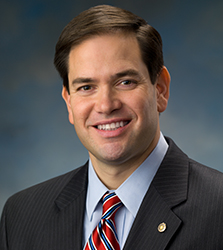
Bush, Christie, Kasich Take on Rubio
Florida Sen. Marco Rubio captured third place in the Iowa caucuses with 23 percent of the vote, which has given him significant media attention for exceeding expectations. Given Rubio’s positioning as a conservative who can also appeal to the GOP establishment, his Iowa performance represents a threat to the campaigns of the other three candidates who are generally thought of as seeking the establishment “lane” in the nominating contest, former Florida Gov. Jeb Bush, New Jersey Gov. Chris Christie, and Ohio Gov. John Kasich.
As Politico and others report this morning, this has led to the three of them targeting Rubio in New Hampshire, sensing that failure to beat him or at least finish close behind could be the end of their candidacies:
At various points, Bush, Christie and Kasich each tried to paint Rubio as a rookie senator and immigration flip-flopper. Rubio finished third in Iowa anyway, within a whisker of Donald Trump and miles ahead of anyone else in his lane.
This time around, on top of their standard attacks, Bush, Christie and Kasich are adding a localized approach. Their message to New Hampshire voters: Rubio doesn’t love you like we do, and he doesn’t deserve your love back.
Separately, the three camps are plotting a barrage of criticism in the days to come, largely to accuse Rubio of failing to put in the one-to-one courtship with New Hampshire voters and then attempting to waltz in late and walk away with their hearts.
The allegation that he hasn’t spent an appropriate amount of time courting New Hampshire voters might seem trivial, or at least not an attack likely to sway many voters away from Rubio, but there is a case to be made that voters in the early states consider whether candidates respect the role and status of Iowa and New Hampshire. Consider businessman Donald Trump’s decision to skip the final debate in Iowa and how it may have affected the outcome of the caucuses on Monday night, as the pollster for Texas Sen. Ted Cruz explained on his blog:
Trump was increasingly rejected by traditional caucus attendees, especially after his decision to skip the final debate….
The last week saw Trump skip the final debate, a move that cost him substantially with traditional caucus goers.
Part of that may have simply been that Trump’s absence allowed Iowa voters more time to see the other candidates, although this was the sixth debate and it seems fair to conclude Trump did not suffer from too few people hearing about his candidacy and his message. More likely the “traditional caucus goers” cited felt that Trump wasn’t sufficiently respectful of Iowa’s status as the first-in-the-nation caucus state, and it was enough to tip some of them away from Trump and towards other candidates.
The Politico article explains how Rubio’s relatively modest time in New Hampshire could hurt him:
The numbers support Rubio’s rivals’ claim that he hasn’t been on their level in terms of specific New Hampshire attention. According to NECN's New Hampshire candidate tracker, Christie has done 176 stops in New Hampshire, Kasich 180 and Bush 106.
That puts all of them well beyond Rubio, who has done 76.
That’s a risk in a state where voters pride themselves on favoring only the most persistent candidates….
“That's his biggest challenge. I'd say historically New Hampshire voters have rewarded candidates who have put in time at town halls and parades and farmers markets. House parties,” [Matt David, chief strategist for the pro-Kasich super PAC New Day for America] said. “And they typically have not supported or have given less support to candidates who have parachuted in to do a quick event and then go to a fundraiser. So Rubio's overall challenge is to try to change voter tendencies in New Hampshire, which is not an easy task.”
The Washington Post has a similar article regarding the three governors and their efforts to blunt Rubio’s rise in New Hampshire:
The sense of urgency was on display here Tuesday as New Jersey Gov. Chris Christie belittled Rubio’s toughness, his intelligence and even his manhood.
“Maybe he’ll do more than 40 minutes on a little stage telling everybody his canned speech that he’s memorized,” Christie said to reporters, mocking Rubio’s tightly controlled campaign appearances. “This isn’t a student council election, everybody. This is an election for president of the United States. Let’s get the boy in the bubble out of the bubble.”…
A key component of Bush’s strategy here is negative advertising, something for which his aides will not apologize. The campaign said Tuesday it was buying two-minute chunks of television air time for its toughest ad yet against Trump, part of a $4.5 million New Hampshire advertising blitz.
Kasich, meanwhile, vowed Tuesday to stay positive, calling on his opponents to stop airing negative ads and to urge their super PACs to do the same.
“I just think it will work for me by being positive, and I wish all of them would just knock it off and let’s just judge who’s got the best program and the best plan and the best message and the most town halls,” Kasich told reporters in Newbury.
But rivals complain the positive tone does not extend to Kasich’s super PAC, or even to his own operation. Kasich’s chief strategist, John Weaver, said that when Kasich is attacked, the campaign will respond in kind.
Each of these three candidates has a single focus at this point: finishing well enough in New Hampshire to change the recent narrative that it is now a three-person race between Cruz, Rubio and Trump. That doesn’t necessarily require beating Rubio next Tuesday, but it does mean finishing close enough to him to justify moving on to South Carolina’s primary the following week.



